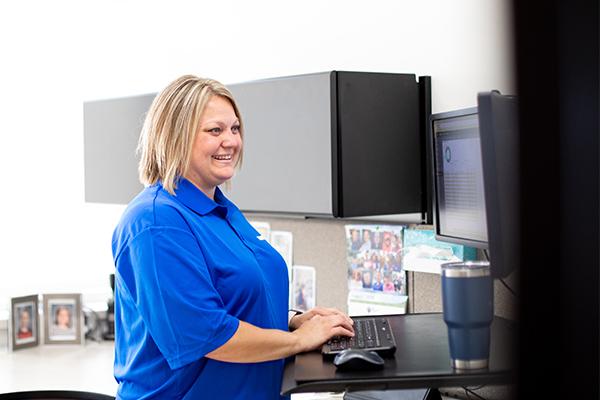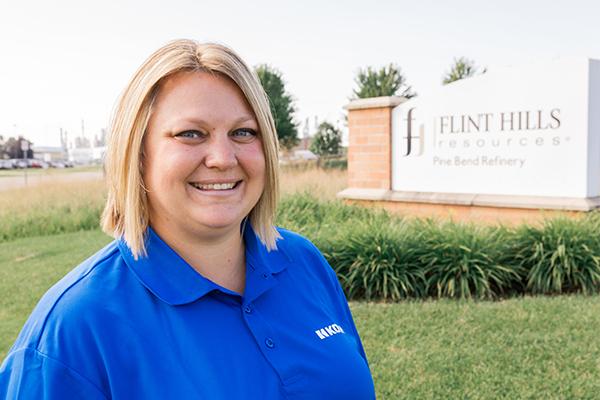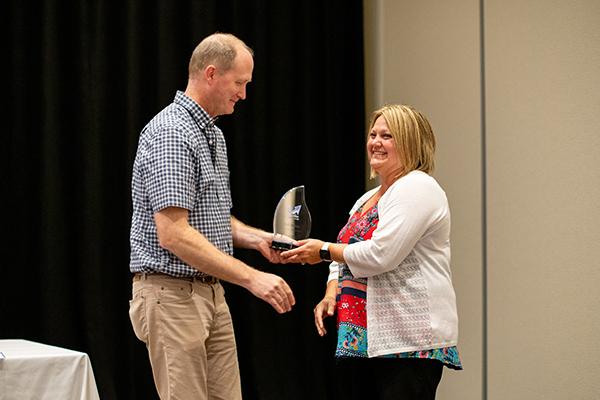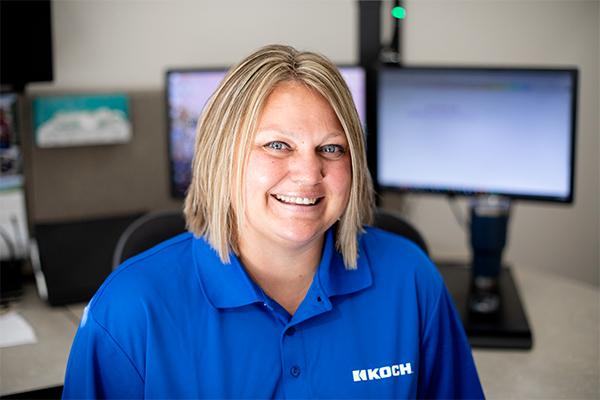How Bot That: Steph Johnson Programmed Herself Into a New Career
Steph Johnson was a pragmatic, by-the-book admin who never strayed too far from her comfort zone. In fact, she surprised herself when she followed her boss’s suggestion to sign up for an automation class. But even more surprising? That decision, made entirely on a whim, ended up transforming not only her job, but her entire professional philosophy. And now, Steph’s helping transform her company.
Steph came to the Flint Hills Resources Pine Bend Refinery, a Koch company transportation fuels facility in Rosemount, Minnesota, as an administrative assistant in 2006 for a characteristically practical reason. “We were about to get married, he works for a really small company, and one of us needed to have benefits,” she explained.
The job served its purpose, but had one major drawback: Steph isn’t a fan of data entry. This was kind of a problem, given that data entry made up the bulk of her role on the instrument and electrical reliability team at Flint Hills. So when she heard about an Automation Anywhere training course, Steph signed up — partly just for a couple days away from data entry. But she was also curious since she had no real knowledge of software, programming or, especially, automation. “I was kind of famous for saying that if I had to keep doing what I’m doing, I'm not going to be doing it much longer,” she chuckled. “And this seemed like it could be interesting.”
Her boss agreed. “I knew she was not fulfilled at all with data entry, so I challenged her to find a better way,” said Greg Perlock, capability director at Flint Hills.
Steph enjoyed the class so much, she decided to take a crack at making her job more interesting. She got to work on a rudimentary bot, known as “robotic process automation,” to take over a dull and repetitive part of her job. “I thought I’d just build this and I'll use it to run my instrument calibration data,” she said.
It wasn’t easy. Steph used the knowledge she’d gained in the training course, but those two days didn’t cover everything required to program the bot. For the next year, Steph read books and combed the internet for information. She drilled instructors and peers from the automation course with questions and sought advice from the automation team and the IT department in Wichita.
“Her entrepreneurial spirit allowed her to deliver,” Greg said. “Plus, we’re a company that has entrepreneurship as one of our guiding principles. I don’t think Steph would have been allowed, much less encouraged, to do something like this at another company.”
When it came time to launch the bot in October 2017, Steph was terribly nervous, even though she had run it multiple times on her own. She’d made adjustments and corrections along the way and wasn’t sure how it would all come together. But her creation ran like a dream. “I think I ran down the hall waving my arms and screaming,” Steph said.
She quickly realized automation might transform her teammates’ jobs, too, reducing errors and saving time and money. She was right. Since 2017, Steph’s bot has reduced her data entry work significantly, saving her around 25-30 hours a month.
This sort of proactive enthusiasm for constant improvement needs to be a hallmark of Koch culture and its employees, said Steve Daley, president of Koch's Market-Based Management capability, which is responsible for cultivating an environment of continuous learning and transformation across Koch's worldwide facilities and nearly 130,000 employees. “To transform yourself, you first have to believe it's possible. We want employees to discover their aptitudes and develop the skills that will enable them to create the job of tomorrow, thereby destroying the job they’re doing today,” he said.
Steph’s success with the calibration bot made her eager for more challenges. “I want to learn more, do more, see what other opportunities are out there,” she said. That’s a good thing, because her Flint Hills team recognized her potential. Steph was transferred into workflow improvement, where she now coaches other employees, helping them adopt automation — and adapt to it. “I sit down with a group and learn all about their workflow from start to finish,” she said. “Then it’s all about building systems to make it better and more efficient.”
Steph has been in her new role — as a sort of automation evangelist — since July, and she’s no longer bored. “Part of what's cool in coming to this new role is I can actually make things better,” she said. She also enjoys the technical challenge of figuring out how to get data to run automatically.
The whole experience has been transformational on a personal level, and it’s made her more willing to take risks. She’s learned that there’s more to her job than simply punching the clock. “I realize that there are opportunities out there,” she said. “It’s OK to look around for them and to offer suggestions and ideas for improvement.” She’s also significantly less afraid of failure. “Just try it. If it doesn't work out, we’ll figure out something else.”
One of the more inspiring parts of Steph’s new role is helping others discover those potentially transformative things about themselves and their jobs. “The people who are doing the work every day have a lot of great ideas about how to make it better, and sometimes don’t even realize it until you start asking them questions,” she said.
That’s a sentiment shared by Steve. “Bots do what they’re programmed to do,” he said. “Humans, on the other hand, can manage trade-offs and understand how they can change their roles to achieve greater fulfillment and better results.”
It’s definitely changed Steph’s outlook on the work she does. “I feel more challenged coming to work every day now,” she said. “I'm learning something new every day, versus when you're doing data entry, it’s just tap, tap, tap. I'm thinking a lot more. It’s just much more enjoyable.”
There has been one unintended consequence: her newfound zeal for bots. “I look at everything now and think, ‘How can we automate that?’”






